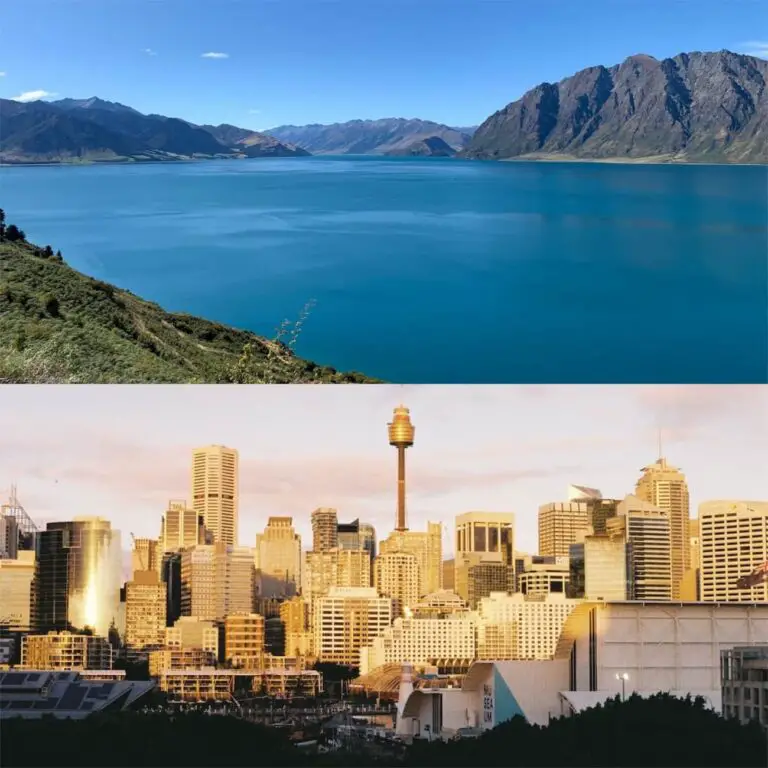Weather And Climate in The UK vs New Zealand: Very Different or Not?

Brits love to talk about the weather. One of the reasons for this is that the weather over there is often miserable, so it’s worth a complaint.
Are you thinking about moving from the UK to New Zealand? Or either of these countries? Going on a break from all the hassles of life? Well, you don’t want to encounter unexpected weather! This is why it is important to read about the weather and climate in the UK and New Zealand to figure out which is better and if there is a difference at all.
The weather in the UK and New Zealand are similar but not entirely the same. Auckland indeed wins in terms of annual sunshine hours and annual average temperatures. But London also beats Auckland when it comes to rainfall and precipitation.
But which one wins and which one loses? Or does it all come down to your personal preference? Want to know more? Continue reading this article to learn more!
How does New Zealand’s weather compare to the UK’s?

For most people, when shifting to a different place, the first thought that comes to mind right after salaries is the weather.
The UK is often called the southern hemisphere equivalent of New Zealand or vice versa. Although both do lie thousands of miles apart, what they share in common is very similar weather.
When a common person thinks of both countries, they imagine cold and chilly weather all year long — which may be true.
But the main difference is that whatever climatic condition the UK is facing will be at its extreme, whereas in New Zealand, the weather remains bearably moderate and temperate.
The average temperatures for New Zealand range from about 10°C on the southern side to 16°C towards the north. The overall region has a temperate climate with little variation between the changing seasons.
On the other hand, the United Kingdom mostly experiences warm summers and cool winters. This climate is also known as maritime since it is influenced by the sea or the oceanic waves. The mild winters go as low as 0ºC, and the summers reach the extremes of 32ºC.
Considering the overall average rainfall of both countries, there is not much difference there. What differs is the months of rain; otherwise, the chances of precipitation are equal for both.
This is mainly because of the influence of the surrounding oceans, which helps keep the temperatures less extreme and bring about plenty of rain.
Most areas of New Zealand have 600 mm to 2,000 mm of high rainfall throughout the year. Some areas are drier; some are rainier. In the graph below, you can see the amount of rain across the entire country:
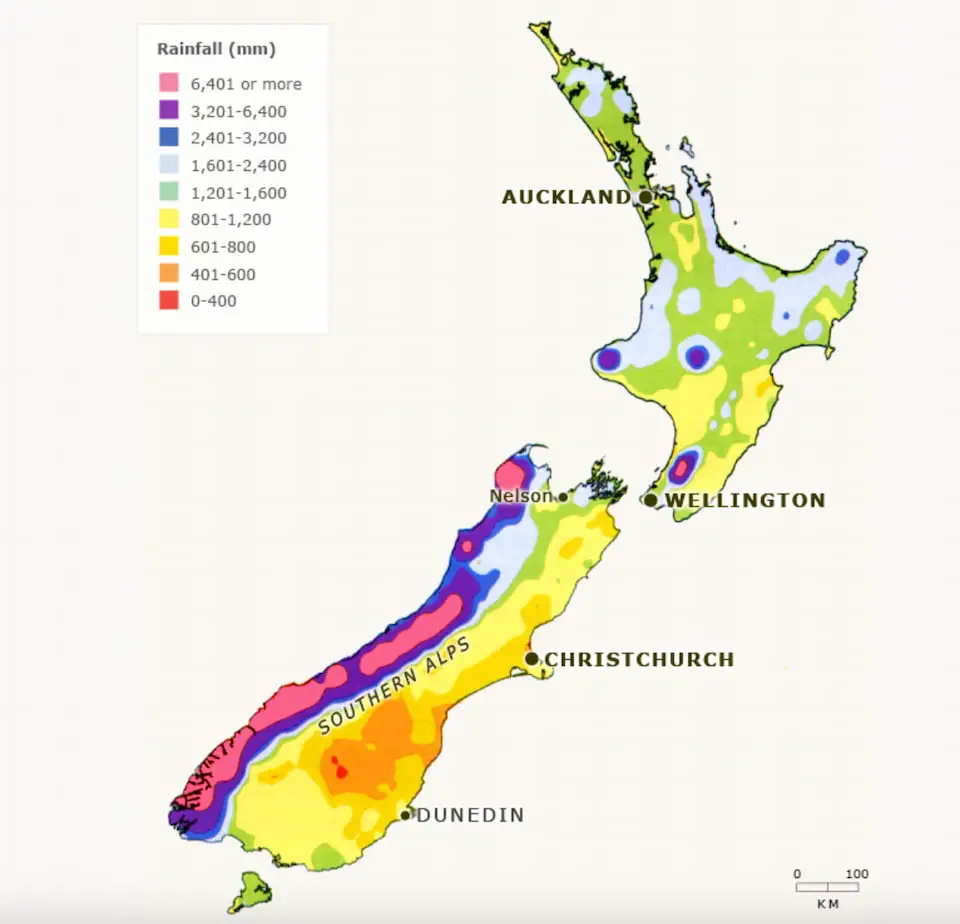
There are some exceptional areas that get over 2,400 mm of rain per year! So, be prepared to get wet!
Whereas the UK experiences an average rainfall of 800 mm to 1,400 mm across all the regions.
Generally, the UK has an average rainfall of 1,154 mm annually, and it rains for 156.2 days annually. That said, some parts of England are significantly wetter than others; for instance, it doesn’t rain much in London, while Scotland and Wales score pretty bad here.
By far, the number of sunshine hours is one of the best things about living in New Zealand. Many areas get over 2,000 hours of sunshine per year. The hottest and most sunny months are opposite to that of the UK and go on from November to February.
The UK enjoys significantly less sun than New Zealand does, only about 1,403 hours per year, on average. That’s also one of the main reasons why Brits move to the faraway country – to see some light!
Dark winters can be very depressing; New Zealand wins in this regard. Even in the shortest month of June, Auckland sees at least 9,7 hours of light. Londoners, on the other hand, have only 7 hours, 49 minutes. and 42 seconds of light on the shortest day of 22 December.
Moreover, January is also very dark in the UK, with average daylight hours of 8. In July, you can enjoy long days, with about 16,5 hours of sun. In New Zealand, the longest days are in December, with an average of 14,6 hours. Therefore, the UK sees more light during the summer!
Snowing in New Zealand is a regular occurrence only in the mountains, and most people aren’t bothered by it — unless the sun doesn’t appear!
A big relief is that it mostly snows in the mountainous areas far away from the coastal lives of the people. Weaker versions of frosts can form anywhere and at any time in the winter.
The UK also has a lot of snow to handle each year. On average, there are 23.7 days of snowfall or sleet which drops the temperature by many degrees.
But there is nothing to worry about as most days; the snow doesn’t even settle on the ground. December to February are the months when the temperature goes as low as 3ºC, as it is the peak of winter in the UK.
After discussing the amount of rainfall, snow, sunshine hours, and climatic zones of New Zealand and the United Kingdom, here is a brief overview of the summers and winters of both countries.
New Zealand’s climate varies all over the different regions of the country. The country covers many climates, from subtropical to alpine areas and even coastal lands.
The summers usually occur during December, January, and February, while the winters last from June to August. The warmest temperatures are between 20 – 30ºC and the coldest between 5 – 15ºC.
For the UK, the winters are from December to February, with the coldest month being February. At the same time, summers are from June to August, which is the complete opposite of New Zealand.
The average temperatures range from 18 to 25°C. The highest temperatures mainly occur around London or the southeast side, and the coolest temperatures are on the other end of England — the northern end.
A significant difference that accounts for the weather variations in both countries is that New Zealand is blessed with multiple high mountain ranges, which creates an Alpine atmosphere.
On the other hand, the UK doesn’t experience such a climate due to the lack of surrounding mountains.
Weather in Auckland vs London

When talking about the climate of any country, you can’t help but think about what the weather of the largest cities feels like. This is why we are going to compare the weather in Auckland and New Zealand to help reduce your curiosity.
Read a full guide on weather in Auckland.
First, let’s talk about the average high and low temperatures. The highest average temperature doesn’t have much difference with London at 22°C (73°F) and Auckland at 23°C (74ºF).
But what differs is the low temperature. The annual lowest average temperature in London is 2°C and in Auckland at 8°C.
The average annual temperature in London is 10.8 °C. The average daily temperature in Auckland during the summer is 23°C (74°F), while winter temperatures are, on average, 14°C (57°F).
In London, on the other hand, the warmest month of the year is July, with an average temperature of 17.8 °C (64.0°F). January has the lowest average temperatures, with an average of 4.8°C (40.6 °F).
Hence, Auckland is generally warmer than London.
Below you can see an overview of average high and low temperatures throughout the year.
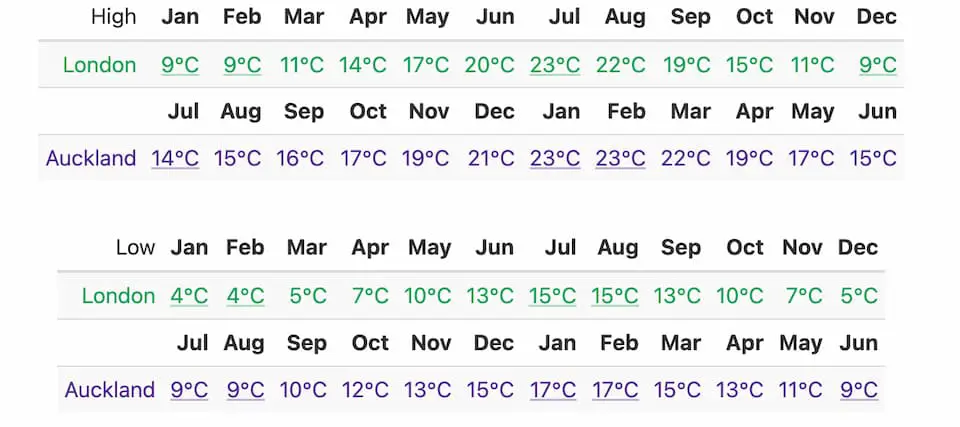
Average temperatures Auckland vs London
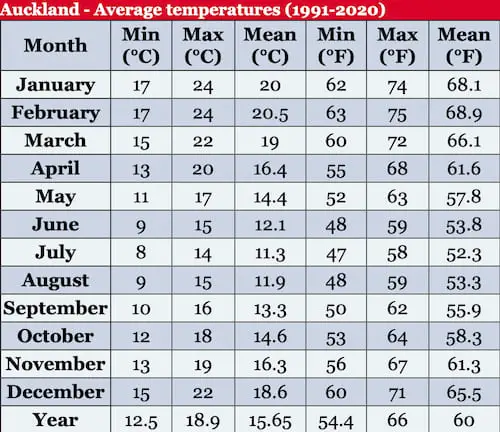
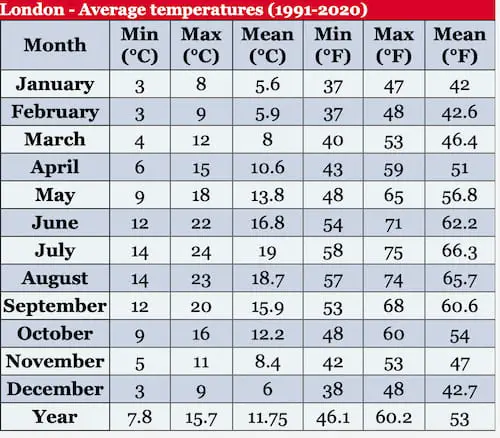
Next, Auckland has an average rainfall of 1,190 mm annually vs 690 mm for London — half of what Auckland receives. The people who haven’t ever lived in London must be surprised upon hearing how little rain London gets and how much rain Auckland receives — surprise, surprise!
Even New York City gets more rain than London, an average of 1,268 mm annually.
The wettest month in Auckland is July, with a whopping 145 mm of rain. In London, the wettest month is November, with 65 mm of rain and 86% of humidity.
Here is the data on average precipitation in both cities:
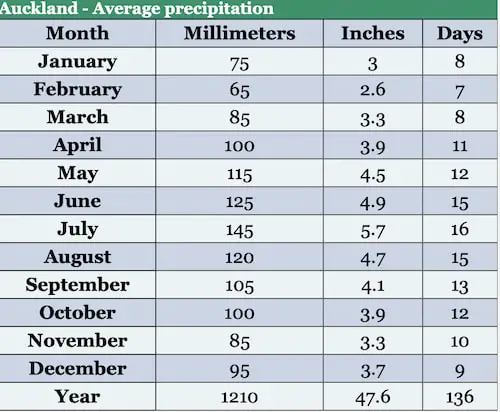
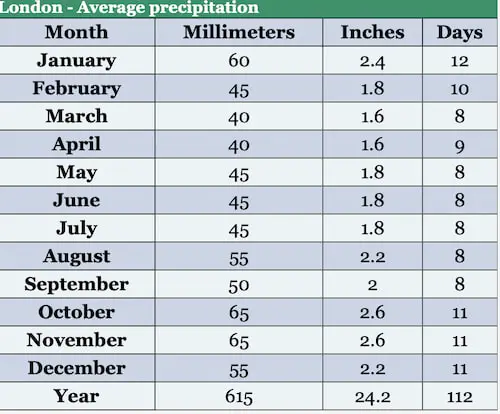
The hours of daylight indicate how much sunlight the people can benefit from. The UK and New Zealand are pretty different in this regard.
Comparing the summers of London and Auckland, it’s a surprise to see that the monthly averages are not so far apart. London is at 16.6 h, and Auckland is at 14.6 hours.
The terrible news is that London gets less sunlight as compared to Auckland in the winters, with an average of 7.9 h to 9.7 h, respectively. And when it comes to sunshine hours, London scores pretty bad, with only 3,3 hours in January.
So, for example, Auckland has sunrise at around 7:35 am and sundown at 5:15 pm in the middle of winter. London sees sunrise at 8:05 am and sundown at 3:55 pm in December. That’s more than 2 hours difference of light right there.
In total, Auckland has 2,066 sunshine hours per year, while London has only 1,675.
Here are sunshine hours per day and in total per month for both cities:
Auckland
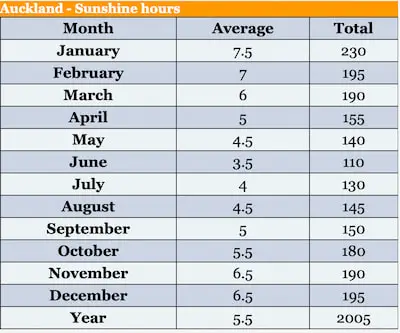
London
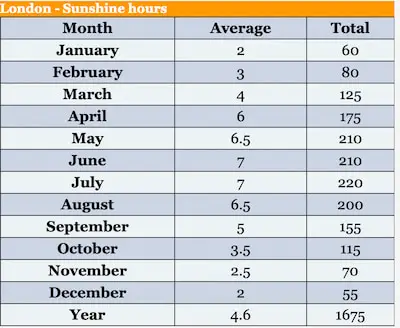
Comparing these two factors would be enough to figure out which place is better to live in and whether the weather and climate of the UK and New Zealand are very different or not.
Auckland indeed wins in terms of annual sunshine hours and annual average temperatures. But London also beats Auckland when it comes to rainfall and precipitation.
And as far as people’s opinions are concerned, most citizens of Auckland often complain about the undetectable change of weather from winter to summer and back within a matter of minutes. But similarly, on the other side, the British also complain whenever a sudden heatwave occurs.
Is the weather better in New Zealand or the UK?
After all of that debate, it all comes down to one question — is the weather better in New Zealand or the UK? But to be honest, even after comparing the data and forecasts of both countries, we can’t come to a decision.
This is because there are a lot of similarities which makes it difficult to choose. Climate and weather in these countries aren’t very polarised as they have very similar geographical characteristics despite being located in different hemispheres.
This brings us back to our first question — are the weather and climate in the UK vs New Zealand: very different or not?
And to answer it, what we can say for sure is that — no, the weathers are not very different from one another. They are polar equivalents of one another.
The main difference between the weather in the UK and New Zealand is the amount of sunshine, which you will get more in the latter regardless of the location within the country.
So, the choice between which country’s weather is better depends on your personal opinions, your needs, and your preferences.





![The Most Beautiful Places To Live in New Zealand [2024]](https://simplenewzealand.com/wp-content/uploads/2023/04/Depositphotos_64449161_L-1-768x360.jpg)
